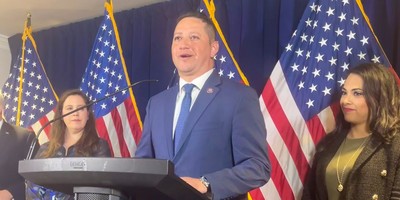Between the tragedy over loss of life and limb in Boston and the rejoicing in the certainty that these two young men will not strike again, there's a large space for reflection. Emotion clouds reason, which is why we live by the rule of law.
The producers of movie Westerns knew how to cultivate the baser instincts. The posse caught the culprit and dragged him to the nearest hanging tree with a minimum of ceremony. Thug justice always stirs the adrenaline and animates the nervous system.
But America gave up frontier justice, and now the law rules. An honest argument emerged after the Boston bombing. Some of us thought Dzhokhar Tsarnaev should hear his Miranda rights at once, and some of us wanted the government to declare him an enemy combatant and question him without lawyers. He might have further information about unfolding plots.
Most people thought they had seen the evidence to convict him, but nobody really knew very much in those early hours. Now we know a little more. We can wish him a speedy recovery if only to find out whether he has knowledge to spare us further ill.
We're told the two suspects acted alone, but Sen. Lindsey Graham asks the right question: "How in the world do we know that?" Where did they get the money to carry out their scheme? Where did they get their suicide vests? You can't buy the vests at Target or Wal-Mart.
Now the younger brother has heard his Miranda rights, and soon he'll have a lawyer, if he does not have one already. This is a good teaching moment for the children -- and for the rest of us, as well -- about why the United States and its rule of law make this the exceptional nation, and to watch how democracy puts in place the mechanisms to render justice.
Recommended
We're in a new and unexplored era of information-gathering, still stumbling about with tools bequeathed through the Internet. They're a decidedly mixed blessing, appealing both to vigilant intelligence and anger-provoked emotion. Photographs of the Brothers Tsarnaev flooded websites, allowing for rapid identification, but the social media further flooded all manner of junk speculation, magnifying animosities and fanning the fires of prejudice, big and small.
How we establish our fact-finding determines what we do about it. One of the glories of our democracy is that we usually move with deliberation through the emotion. How we frame the terrorist potential confronting us matters. Language matters, too. Obfuscation, euphemism and exaggeration disfigure both what we see and how we interpret it.
Barack Obama and his administration erased meaningful metaphors and powerful language describing the "war on terrorism." Words such as "jihadist," and "radical Islam," the plain speech of the George W. Bush years, were dropped as if something foul. In 2010. the National Security Strategy formally replaced the term "Islamic terrorism" with "violent extremism," generalizing the threat and blurring the lens. "Terrorism" at Fort Hood, Texas, was reduced to "workplace violence," despite evidence that the Muslim major who killed 13 and wounded 32 others had been counseled by an al-Qaida mentor.
Playing games with the language was intended to court the Muslim world, but it confuses anyone trying to make sense of the appeal of terrorism, and the theology (if theology it is) of radical Islam. We're entitled to ask why this particular religion at this time so readily becomes a violent vehicle for a young man yearning for moral authority.
When Tamerlan Tsarnaev slipped into the hedonistic life of marijuana, girls and booze, his mother, as mothers will, urged her son to seek his religious roots. He did just that, but what he found in those roots that led him to wholesale violence is something we must find out. We must take care not to hold peaceful and devout Muslims responsible for the evil acts of the radicals who pursue violence, but we must examine what in the religion encourages death and mayhem. It's neither an academic nor a prejudicial pursuit, but one based on experience.
The U.S. government's abuse of semantics hasn't reduced the fear of violence incited by radical Islam. This abuse of language does no favor to devout and peaceful Muslims, either. The Pew Research Center in 2010 found that fewer Americans felt favorably toward Islam than five years earlier; more Americans believe Islam encourages violence than they did in the George W. Bush years.
"There is little doubt that the administration's unwillingness to speak candidly about Islamic terrorism has taken a toll on the American public's trust in its ability to confront the threat," observes Stuart Gottlieb in National Interest magazine. When rhetoric understates and obfuscates the threat, distrust rises. Reality is hard to hide.

























Join the conversation as a VIP Member